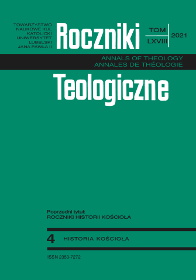Stefan Wyszyński: The Lublin’s Period of Episcopal Ministry (1946-1949)
Stefan Wyszyński: The Lublin’s Period of Episcopal Ministry (1946-1949)
Author(s): Ryszard FicekSubject(s): Christian Theology and Religion, History of Church(es), Theology and Religion
Published by: Towarzystwo Naukowe KUL & Katolicki Uniwersytet Lubelski Jana Pawła II
Keywords: Bishop Stefan Wyszyński; diocese of Lublin; II world war; Communist ideology; the Catholic University of Lublin; reconstruction of the diocese; pastoral initiatives
Summary/Abstract: On March 4, 1946, the Vatican “Congregation for Extraordinary Affairs,” then responsible for episcopal nominations, sent a document to the office of Cardinal August Hlond about the appointment by Pope Pius XII of the first Polish bishops after the war, including a new ordinary of the Lublin diocese: „Beatissimus Pater promovit Reverendum D. Stephanum Wyszyński e clero vladislaviensi ad Ecclesiam Cathedralem Lublinensem. Eadem Sanctitas Sua concedit dicto Electo Stephano Wyszyński indultum recipiendi conssecrationem episcopalem necnon capiendae possessionis dioecesis Lublinensis priusqam ad eum Bullae Apostolicae pervenerint”.At that time, the nominee bishop was not quite 45 years old. Moreover, in a relatively short period of his rule in Lublin (two years and eight months), Wyszyński did a great job. Above all, though, he initiated the diocese's renewal and reconstruction from the horrible war damage and introduced it on a new path of pastoral development. Undoubtedly, it was a time that can be described as a great revival of the Catholic Church in Poland.Therefore, the above article exposes how the episcopal nomination and ingress to the Lublin cathedral opened for Bishop Wyszyński new perspectives as well as set further tasks in his pastoral ministry to the Church in Poland and the world. Moreover, according to the author of this study, over two and a half years of episcopal service in the Lublin diocese was also – in some way – an experimental training ground, where Bishop Wyszyński could use as well as develop his pastoral experience gained earlier in Włocławek. Additionally, it was also the next stage of preparation to undertake more essential tasks in the Church. In other words, the Lublin pastoral ministry of Bishop Wyszyński turned out to be a valuable experience in the perspective of later activity as ordinary of the Gniezno and Warsaw dioceses as well as the Primate of Poland.
Journal: Roczniki Teologiczne
- Issue Year: 68/2021
- Issue No: 4
- Page Range: 113-129
- Page Count: 17
- Language: English

